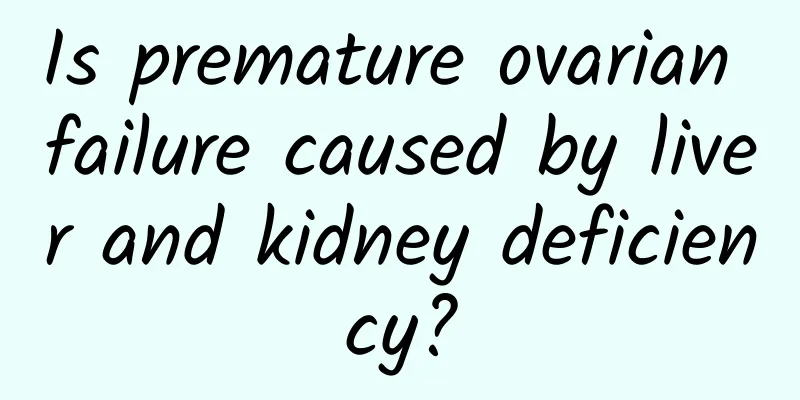Is premature ovarian failure caused by liver and kidney deficiency?

|
Premature ovarian failure is not completely equivalent to liver and kidney deficiency. The main causes of premature ovarian failure include genetic factors, environmental influences, physiological changes, and the presence of certain diseases. From a genetic point of view, some women may carry gene mutations that cause premature ovarian function decline, such as abnormal amplification of the FMR1 gene. Environmental factors such as long-term exposure to harmful chemicals, radiation, or severe emotional stress may also accelerate the decline of ovarian function. Physiologically, immune system diseases, thyroid dysfunction, or other endocrine disorders may also lead to premature ovarian failure. Although traditional Chinese medicine theory believes that liver and kidney deficiency may lead to hypogonadism, it is necessary to combine modern medical knowledge to look at individual differences and the complexity of the cause. In the face of premature ovarian failure, treatment strategies include drug therapy, lifestyle adjustments, and in some cases, surgical intervention. In drug treatment, estrogen replacement therapy (HRT) is often used to relieve symptoms and prevent osteoporosis. In addition, Chinese medicines such as Angelica sinensis and Polygonum multiflorum have also been studied for conditioning the body. Surgery is rarely used for premature ovarian failure, but it may be required in specific cases. For example, when polycystic ovary syndrome is accompanied by other gynecological problems, surgical treatment should be considered. In daily life, it is recommended to maintain good living habits, including a balanced diet and moderate exercise. Soybeans and their products contain natural phytoestrogens, which can be consumed in moderation to help regulate endocrine. At the same time, yoga and meditation can also help relieve stress and improve the quality of life. In the face of premature ovarian failure, treatment strategies include drug therapy, lifestyle adjustments, and in some cases, surgical intervention. In drug treatment, estrogen replacement therapy (HRT) is often used to relieve symptoms and prevent osteoporosis. In addition, Chinese medicines such as Angelica sinensis and Polygonum multiflorum have also been studied for conditioning the body. Surgery is rarely used for premature ovarian failure, but it may be required in specific cases. For example, when polycystic ovary syndrome is accompanied by other gynecological problems, surgical treatment should be considered. In daily life, it is recommended to maintain good living habits, including a balanced diet and moderate exercise. Soybeans and their products contain natural phytoestrogens, which can be consumed in moderation to help regulate endocrine. At the same time, yoga and meditation can also help relieve stress and improve the quality of life. Daily care is essential to slow the effects of premature ovarian failure. It is very important to have regular health checks to monitor changes in your body. Avoid exposure to harmful environments that may trigger or aggravate the condition, including chemicals and excessive radiation. Mental health should not be neglected. Seeking psychological support or participating in group activities can reduce emotional burden. When symptoms appear early or the risk of premature ovarian failure is suspected, it is crucial to seek medical attention in time to obtain professional diagnosis and treatment advice. Understanding your own health status and adjusting your lifestyle according to the doctor's guidance can effectively maintain health and improve the quality of life. |
<<: What is the cause of postmenopausal cervical adhesions
>>: Can I get pregnant if I am obese and have amenorrhea for two years?
Recommend
What should I do if I get uterine fibroids during pregnancy? What are the dangers of uterine fibroids?
What should I do with uterine fibroids during pre...
What is adnexitis?
Adnexitis may cause symptoms such as lower abdomi...
You can't escape the year-end party dinner. Five eating principles to avoid obesity
The overall economy is not good this year. Althou...
What are the dangers of irregular menstruation?
Harm of irregular menstruation: Headache Women wi...
When is the best time to abort an ectopic pregnancy?
Ectopic pregnancy refers to an abnormal pregnancy...
What are the dangers of multiple miscarriages?
The medical purpose of artificial abortion can be...
Sitting for a long time and not moving enough will make you gain 3 pounds. Here are 4 magic tricks to fight obesity! Weight loss doctor: Accurate weight loss to prevent weight regain, are you following along?
Many people stayed at home during the epidemic pr...
Zhao Wei lost 12kg by drinking sweet potato soup and red date soup? Doctor: Be careful of becoming more hungry and thirsty when drinking soup to lose weight
Female celebrities all like to be praised: "...
Early symptoms of cervical erosion
Cervical erosion is more common in married women....
Early and late symptoms of bacterial vaginosis
Perhaps many women think that bacterial vaginosis...
What are the types of cervicitis?
A common pathological change of cervicitis. The c...
What are the early symptoms of ectopic pregnancy?
What are the early symptoms of ectopic pregnancy?...
The harm of irregular menstruation at the age of sixteen
What are the dangers of irregular menstruation at...
What tests can detect congenital absence of vagina?
What kind of examination can detect congenital ab...
What are the symptoms of habitual miscarriage? Pay attention to these two groups of people who are prone to habitual miscarriage
Although the incidence of habitual miscarriage is...









